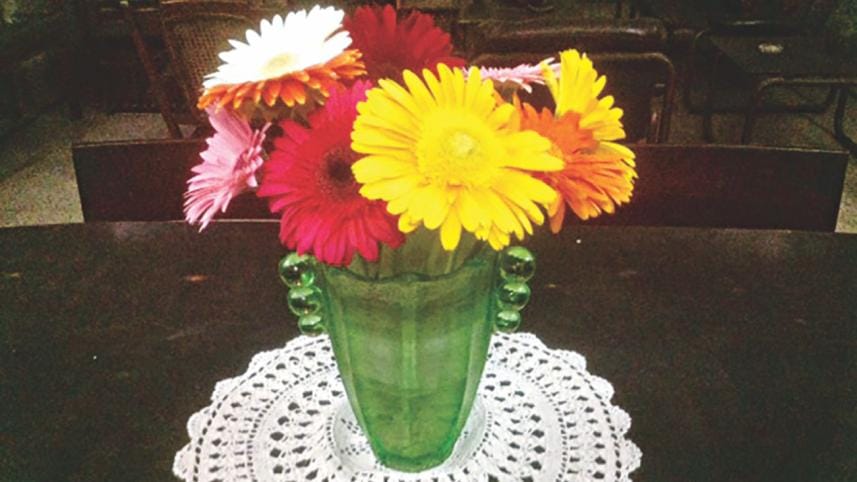Shadowtime: Notes on living in two temporal scales simultaneously

Memories of my father are keeping me awake tonight. Two hours to Fajr Azan on the Friday before Independence Day.
The street-cleaner's jharoo gratingly rubs the asphalt below my bedroom window for a few minutes.
Silence again, as he moves on further down the street.
Two years ago, father's journey to his eternal abode began at this hour, and ended at two o'clock in the daylight of March 25.
And time stopped for me.
***
Work stopped for everybody the next day, Independence Day.
Frozen in grief, my mind stopped its colloquium with the world.
I lay immobile and numb in my home, as father lay lifeless and cold on his bed of ice.
Burial with full military honours and ceremony the day after Independence Day.
***
September of two years ago, and Spring bloom in the Southern Hemisphere, autumnal chill in the Northern.
I am in my daughter's home, recovering from torpid days of depression.
Recovering from cataract surgery. Clearer vision with implanted lens.
Dreaming of talking with dad, in the middle of the night, the witching hour.
Jolted to alert wakefulness by sudden silver light and smattering of lashing rain against the window-pane.
I am back in the lap of my surreal nor'wester, my Kalboishaki.
***
Turn, turn, turn, my mind sings, with Mary Hopkins in 1968.
For every season there is time, time to reap and sow, to be born, to die.
The haunting image of the woebegone Tithonus floats up in my mental landscape.
"The woods decay, the woods decay and fall, The vapours weep their burthen to the ground, Man comes and tills the field and lies beneath."
Spontaneously, rhythmically, Tennyson's lines emanate from my circumambient sadness at being left bereft.
Yet, there is gratitude in my heart too, for father's peaceful passing to the other side.
His soul had returned whence it came, trailing clouds of glory, in the vigorous flowering Bangla season of hope and renewal, in Falgun.
***
Twenty days before Pahela Boishakh, a grief-stricken daughter says final farewell to her father in the crowded city of her ancestors.
***
Two years have passed, with the length of twenty-four months of good days and bad days, of family quarrels and reconciliations, of marriages and new births.
Father's transition brings change and transition in his children's lives.
Thus flows forward the current of the river of life, in the natural order of things, in the inexorable law of time and generation.
***
With two days more to the second anniversary of father's death, tonight I contemplate the paradox of life, of the intricate mystery of the warp and weft of the human loom.
I look lovingly at the antique moss green Belgian glass vase, a treasured object from the post Second World War period in Dhaka.
I found it under my grandfather's mahogany four-poster bed in our Armanitola home in my late teens.
Now, this vase is on the oval dining table in my own home, a resplendent vessel for bright Gerbera flowers.
***
The loud colours call out to me to paint a rainbow.
The bold white, pink, orange, red, yellow, purple long- stemmed petals of Falgun are shouting to catch the wild spirit of approaching Kalboishaki.
***
Green vessel with vibrant life.
Life's continuity artfully contained in one authentic place, in one specific space in real time.
A seamless horizontal line from my grandfather to my father to me.
From the grandfather who named me "titli" when I was a toddler.
Later, inspired, grandfather named me "toofani" when I was five.
***
A precious gift of a pet-name from one who cherished my wild questing spirit.
***
Green vase. A concrete, syncretic symbol.
A family icon cementing the generations across time and space.
Across the earth and the heavens.
In my vision, you immutable green vase, are the matrix and the nexus of my family's master-narrative.
***
In the quiet of the night a sly mosquito hums close to my cheek.
The tick-tocking wall clock is a slow goods train on tracks, somewhere afar.
It is half-past three in the morning. Almost two hours to first light.
***
BBC News. Syria and Ghouta and the children.
Oh, the beautiful, suffering angels caught in man's inhumanity.
Insanity.
Forgive us, Divine Father. Forgive our trespasses.
Look kindly on the meek and the innocent.
Kalboishaki, come!
Come. Cleanse this earth of wickedness and killing. Wash away our sins.
Help us open a new humane Halkhata.
Rebecca Haque is Professor, Department of English, University of Dhaka.




Comments